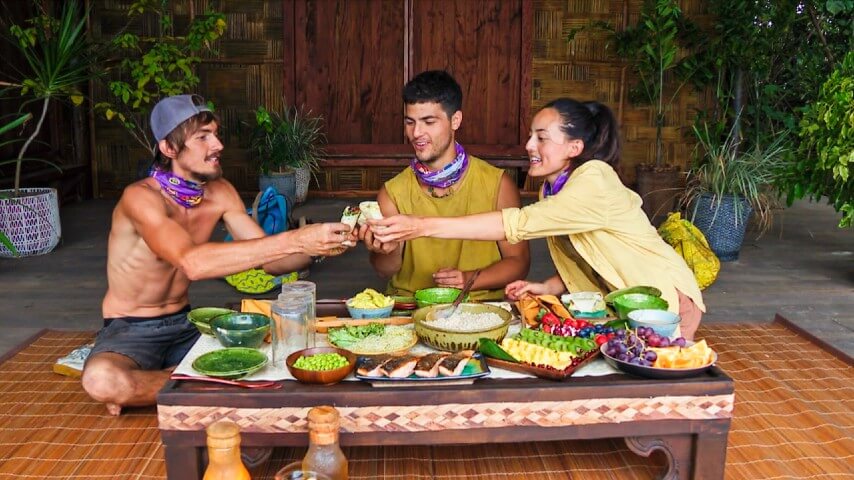Survivor's edit should focus on the players, not the game
Part of the joy of this reality competition is watching people from different tribes connect, but we barely see them chat anymore.
Photo: CBS
Going into 2025, Survivor finds itself in a unique spot. With season 47 nearing its conclusion and 48 already filmed, all eyes are on 49 and especially 50. We’ve seen nearly seven seasons of the New Era so far, and despite the show’s huge popularity and ever-growing fan base, viewers remain divided on how it should move forward. With a landmark season set to film next summer—the first all-returning players season since season 40—Jeff Probst and the producers have some big decisions ahead of them.
One thing is clear: Ninety-minute episodes, introduced last fall during the writers’ and actors’ strikes, are here to stay. The shift has proven popular, generally speaking. Five episodes into season 45, the show was praised for its renewed clarity when it came to both the social relationships on the three tribes and the strategic discussions that went into each pre-merge vote. Even if the current version of the game relies too heavily on twists and other needless complications—like taking away players’ votes—at least the longer runtime leaves more space to keep everything straight.
Since that point, though, we’ve seen that lengthier episodes don’t automatically guarantee a better balance in the edit. Dee Valladares in 45 was probably the most dominant winner of the New Era, but her actual personality and social game were decentered before the last episode or two, with characters like Jake O’Kane and Emily Flippen leaving a stronger and more consistent impression. The season 46 pre-merge felt bloated and unpleasant because of the overexposure of the Yanu tribe (especially Bhanu Gopal, whom the editors seemed to enjoy a lot more than the viewership). The merge fared better, sustained with real, messy human drama. But perhaps that was only possible because so many players misused or neglected idols and advantages, only leaving the editors so much to work with.
And in season 47—a generally pretty solid batch of Survivor with a likable, dynamic cast—the editing remains a mixed bag. Yes, the show has severely cut down on the unnecessary “sob story” segments from past seasons, letting the characters and their present-day actions speak for themselves. And it’s easy to appreciate many of the recent editorial flourishes, like Sue Smey’s “I hate Kyle” supercut from last week’s episode, or Andy Rueda’s “web of alliances” analogy (intercut with a visual of a spider ensnaring an ant). Most of the time, the editors seem to understand how to efficiently manufacture ambiguity in the lead-up to a tribal council, even when the vote is nearly unanimous. But they’ve also shown a refreshing willingness to play into the obviousness of an outcome, as they did in the “downfall of Rome” episode.
But editing an episode of this show isn’t just about crafting a coherent story, or building tension and stakes. It’s also about knowing when to let a story breathe and when to fill in more detail. The same episode that luxuriated in Rome’s demise, for example, apparently didn’t have time to show the old-fashioned schoolyard pick before the merge challenge, a first in the New Era. And Sierra Wright later tweeted that she’d spent the challenge vomiting on and off the high platform, an intriguingly gross detail that would’ve only required a second or two of screen-time to showcase. These minor omissions don’t actively damage the episode, necessarily, but they’re indicative of a strain on the edit that shouldn’t exist with the freedom of extra-long installments.
Perhaps it comes down to the show’s tendency to overexplain itself, particularly concerning the game’s twists and turns, while undervaluing the social dynamics that bond us to these characters. The majority of last week’s tribal council chatter revolved around discussion of the tribe’s pretty-much-unanimous choice to sacrifice their Shots In The Dark rather than any social dynamics. More galling was the tribal in episode seven during an interminable discussion about a very simple choice for the ex-Tukus (vote out Rachel LaMont or turn on each other?) that ended up not mattering at all when Rachel played her Safety Without Power advantage and left tribal early.
Tribal council always involves a lot of play-acting, but that’s especially true now. The lack of real probing into tribe dynamics and alliances these days may be a Jeff-Probst-the-host problem, to be fair. But there’s also no need to prioritize these conversations in the edit if they don’t contain any real insight, especially at such a crucial point in the game. This is the first merge vote of the season, technically, and it should be thrilling to just hang out with the players, exploring all the new dynamics and unlikely (or likely) friendships and rivalries as everyone shares the same camp. (It’d be nice to hear the discussion around the new tribe name, for one.) Instead, we mainly just see strategic bonds being solidified or tested.
 Keep scrolling for more great stories.
Keep scrolling for more great stories.

